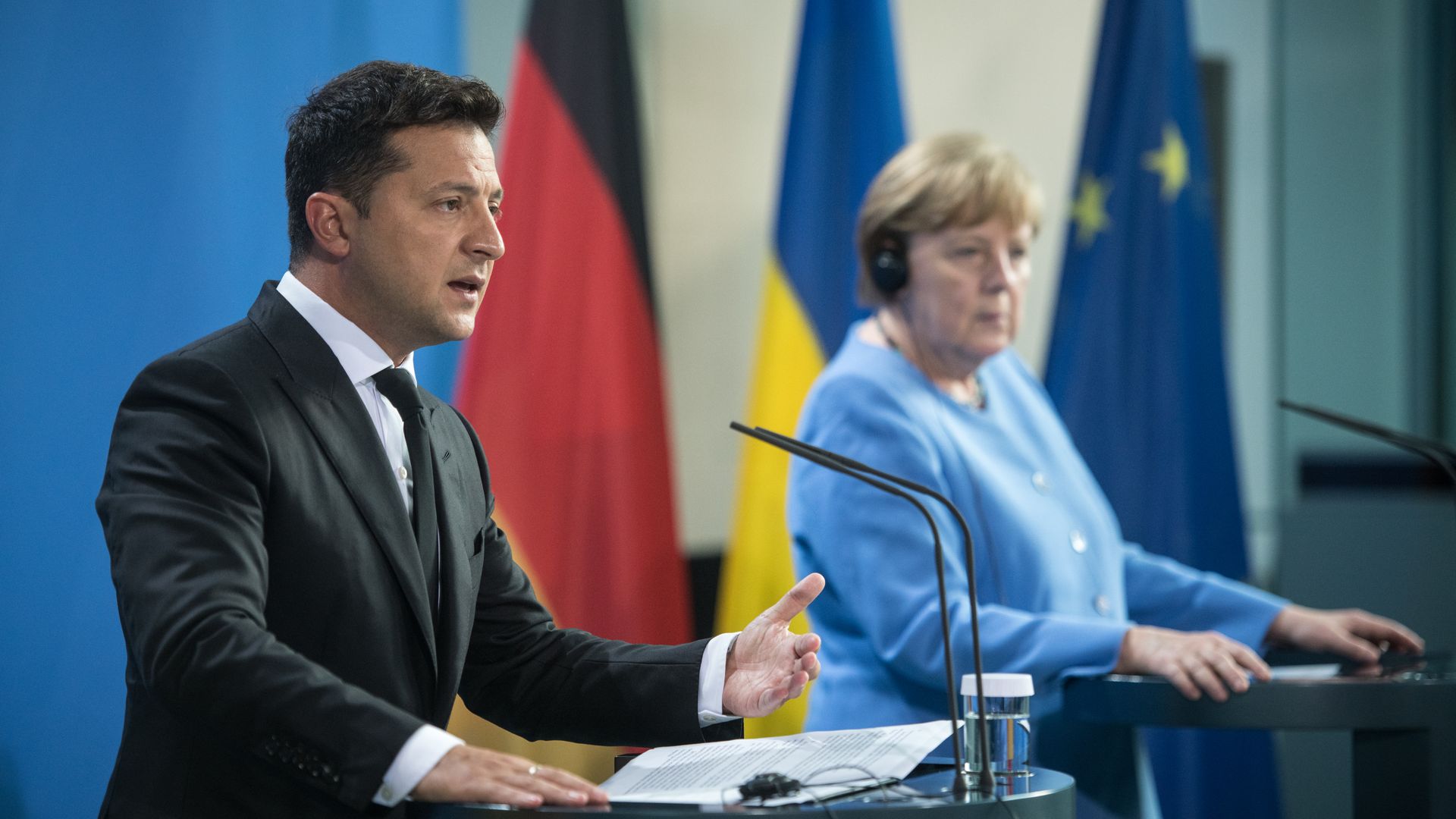Ukraine fears U.S.-Germany deal on Putin's pipeline falls far short
Add Axios as your preferred source to
see more of our stories on Google.

Zelensky and Merkel. Photo: Stefanie Loos-Pool/Getty Images
The soon-to-be-announced deal between the U.S. and Germany on the Nord Stream 2 pipeline falls well short of Ukraine's hopes and fails to address the country's national security concerns, an adviser to President Volodymyr Zelensky tells Axios.
Why it matters: The deal is designed to allay concerns in Kyiv and on Capitol Hill about the imminent completion of the Russia-to-Germany gas pipeline, which the Biden administration itself has condemned as "a Kremlin geopolitical project that threatens European energy security."
- The State Department waived sanctions on the corporate entity and CEO overseeing the construction of Nord Stream 2 in May, drawing widespread condemnation from members of Congress.
- Secretary of State Antony Blinken testified last month that the completion of the pipeline was a "fait accompli," and that sanctions would further damage relations with Germany that had frayed significantly under President Trump
- Poland and other countries on NATO's Eastern flank are also concerned that the U.S.-Germany deal is superficial and doesn't address the deeper security questions.
Behind the scenes: The deal has been finalized in the wake of Merkel's visit to D.C., and as the U.S. and Ukraine worked to set a date for Zelensky's visit to Washington.
- That visit will now be at the end of August rather than in July, as Zelensky had originally said it would be.
- The White House confirmed Wednesday it will be Aug. 30, at which time Congress will be out of session, making it harder for Zelensky to hold meetings with allies on Capitol Hill or rally opposition to Nord Stream in Washington.
Between the lines: The fact that the date was discussed in the same conversations in which senior U.S. officials were seeking Ukraine's support for the U.S.-Germany deal led the Ukrainians to believe their reaction to the deal could have bearing on the visit.
- A senior administration official denied that in a statement to Axios: "The scheduling of President Zelenskyy’s visit has nothing to do with discussions on Nord Stream 2. We have been working diligently to confirm a date and we are pleased we have been able to confirm one. President Biden is looking forward to welcoming President Zelenskyy to the White House."
State of play: Republicans in Congress are already lining up to bash the deal, and the Ukrainians are deeply concerned about its contents.
- As President Biden met with German Chancellor Angela Merkel in Washington last week, Zelensky tweeted: "I believe that our American & German partners will jointly oppose the aggressor, not encourage it. And no decision on Ukraine without Ukraine."
- Sen. Jim Risch (R-Idaho), the top Republican on the Senate Foreign Relations Committee, said in a statement Tuesday that the proposed deal "is full of promises and assurances, but offers little in the way of meaningful measures to address the key national security threats Nord Stream 2 poses to U.S. allies and interests."
- Several other congressional Republicans echoed those sentiments.
Driving the news: The Biden administration argued today that it was Donald Trump who missed a chance to stop the pipeline by implementing sanctions sooner, and that they secured the best deal they could from Germany to effectively drop their opposition to a pipeline that was 90% complete when they took office.
- In it, Germany pledges to "take action at the national level and press for effective measures at the European level, including sanctions," if Russia tries to "use energy as a weapon" or cuts off gas to its neighbor — which would now be much simpler as Nord Stream 2 circumvents Ukraine, unlike existing pipelines carrying Russian gas to Europe.
- Germany also promises to use "all available leverage" to ensure Russia extends a deal through which Ukraine receives around $3 billion in transit fees annually. It's unclear whether that promise has any teeth.
- Germany also promised to launch a "green fund" to help Ukraine modernize its energy sector.
Ukraine had pushed for a deal that would link the Nord Stream issue directly with Ukrainian national security, either through a pledge of military support or a long-term commitment to Ukraine's development that would send a signal to Russia.
- "Based on what we've been told, the deal does not address the fundamental security concerns of Ukraine," the Zelensky adviser said, adding that Russia might have pushed further into Ukraine in 2014 if the pipeline had been in place.
- Russian gas currently flows through Ukraine en route to Europe. Nord Stream 2 would bypass Ukraine and give Russia valuable leverage over its former client state.
Worth noting: Zelensky's visit was announced a day after the Ukrainian president criticized Biden's approach to Nord Stream 2 in an interview with Axios and pleaded for a meeting before the June Biden-Putin summit.
Editor's Note: This story has been updated with White House confirmation of the date of Zelensky's visit.

